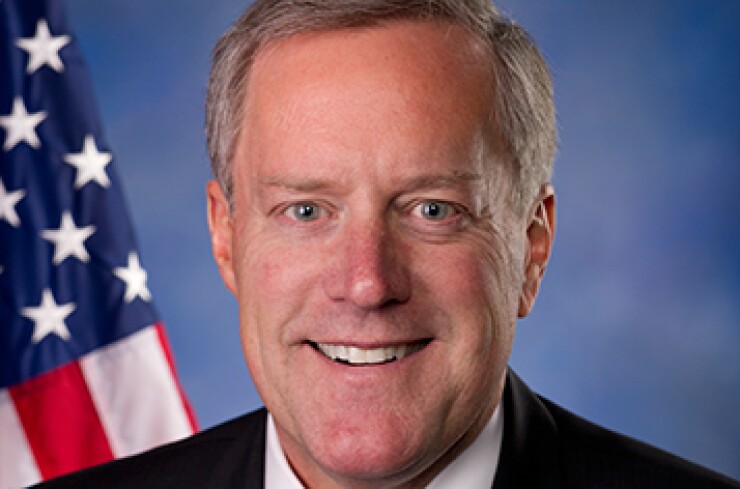
WASHINGTON – Despite House Republican threats of criminal prosecution, the District of Columbia Council will hold the first of two votes Tuesday that would give the district budget autonomy and the ability to spend its local tax and fee revenues without annual congressional appropriations.
The district's latest push for fiscal independence was met with opposition from House Republicans last week, including Rep. Mark Meadows, R-N.C., who serves as the chairman of the House Oversight and Government Reform's government operations subcommittee that has authority over the district's budget.
Meadows led a subcommittee hearing on Thursday to determine whether the district's Local Budget Autonomy Act, enacted in 2013, is consistent with the Home Rule Act adopted by Congress in 1973. He warned that passing a budget without final congressional approval could lead to federal charges against district employees. The district is currently embattled in a lawsuit alleging its Budget Autonomy Act is unlawful.
"It is a great concern of mine …. to put [district residents] in a legal battle that is still ongoing and still being litigated, but potentially has the threat of not only fines but criminal violations," Meadows said.
Tuesday's vote marks the council's first vote on the Fiscal Year 2017 Budget Local Portion Adoption Act of 2016 (the budget support act) and the Fiscal Year 2017 Budget Federal Portion Adoption and Request Act of 2016 (the budget request act). The council will hold its second vote on the budget request act on May 31. It will vote for a second time on the budget support act in June.
Should it be approved, Mayor Muriel Bowser's proposed $13 billion budget for fiscal 2017 would be the first in which the district would have control over spend its own money. D.C. is currently recognized as a "mutual corporation" subject to laws enacted by Congress.
Federal law currently states that D.C.'s annual budget must be approved by a majority or two-thirds district council vote as well as an appropriation passed by Congress and signed off by the president.
Rep. Gerry Connolly, D-Va., the subcommittee's top Democrat, citing his 14 years of experience working in local government in Fairfax County, said he supports D.C. budget autonomy during Thursday's hearing.
"I cannot imagine how a local government could function effectively and efficiently if each budgetary decision required congressional approval," Connolly said.
Last month, D.C. Mayor Muriel Bowser called for a November vote by residents to petition Congress to make the district the country's 51st state, with budget autonomy marking the first step in what is expected to be an uphill battle to statehood.
Statehood would not only give the district control over its tax dollars, but also would give taxpayers representation in Congress. But the Republican-led Congress is unlikely to support statehood because that would most likely mean adding more Democrats to Congress from what is historically a liberal stronghold.
A district council committee held hearings on the budget throughout April and held votes earlier this month.
In March, a District of Columbia Superior Court judge ruled that the district's Local Budget Autonomy Act is lawful under district law, permitting the district to only ask Congress for federal funds, which is roughly 10% of its budget.
The act removes both Congress as well as the president from having to sign off on the appropriation of the district's own funds, which account for roughly 90% of the budget. The Home Rule Act allows district residents to vote for their elected officials but gives Congress ultimate authority over the district's budget and laws. Federal agencies and the district would be denied the ability to spend funds should Congress fail to pass appropriations legislations for any given fiscal year.
The lawsuit had been filed in November by political watchdog group Judicial Watch on behalf of district taxpayer Clarice Feldman, claiming the Local Budget Autonomy Act violates a provision of the Home Rule Act that states no district funds can be expended by the district unless approved by Congress.
Both Bowser and D.C. Chief Financial officer Jeffrey DeWitt were named as defendants in the suit.
DeWitt filed a motion to dismiss Feldman's complaint in February, but the following month, the House of Representative's bipartisan Legal Advisory Group, made up of five Republicans and Democrats, filed a friend-of-the-court brief urging the court to deny DeWitt's motion.
"Its status remains in legal limbo until the courts issue a final and definitive ruling," Meadows said of the lawsuit at the hearing on Thursday.
AshLee Strong, a spokesman for House Speaker Rep. Paul Ryan, R-Wis. backed Meadows' calls to block budget autonomy last week.
"The speaker supports chairman Meadows' efforts to show the unlawfulness of the D.C. Budget Autonomy Act," Strong said.
On Friday, Bowser launched a website that provides district operational and capital budget information from fiscal 2012 through the proposed fiscal 2017 budget. Bowser said it would provide "greater insight and transparency" into D.C.'s budget and its expenditures.





